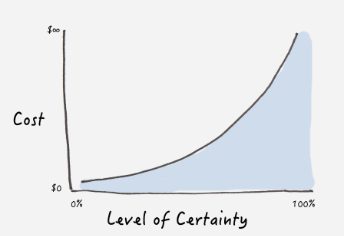Why Bets?
Bets are a more honest description of our confidence in the actions we are planning. Given the apprehension I sense around betting, I want to share my reasoning for explicitly talking in bets.
Recently at TeamSnap, I presented one of our team's upcoming work as bets. I then received a slew of Slack DMs, where I learned many people find the concept of "betting" at work challenging. This sentiment was also felt in the team when I initially brought forward the idea. The most common feeling expressed has been, "I feel I should be fully confident in my ability to complete my work before committing to it."
Bets are a more honest description of our confidence in the actions we are planning. Given the apprehension I sense around betting, I want to share my reasoning for explicitly talking in bets.
#1 Nothing is certain

Life is chaotic. There are too many variables at play to make a 100% confident prediction for nearly any action—or activity—of significance. By treating our planning at work as wholly accurate, we are deluding ourselves. We become overconfident. We plan poorly. Ultimately we become less resilient to failure. We must prepare with the knowledge that the future is uncertain.
#2 The cost to reduce uncertainty grows exponentially

The purpose of planning is to reduce the uncertainty acknowledged in point #1. However, the cost of lowering our uncertainty is not linear; it grows exponentially. Colin Powell gave us the 40/70 rule, summarized as, "once you have 40-70% of the information, go with your gut." This principle persuades me to act when I feel I have enough information to make a bet on myself. It is a well-informed and—hopefully—intelligent bet, but it is nevertheless a bet. We should not spend more on reducing our uncertainty than it is worth.
Final Thoughts
Today, excessive delays in the name of information-gathering breeds "analysis paralysis."
Colin Powell
So, back to the lede question of this post, "why bets?" We make bets because we are uncertain of the outcome of our actions. However, we are highly confident in the information we do have to make a well-informed bet. We do not want to make poor decisions by acting early. We do not want to make costly decisions by moving late. By thinking in bets, we thread the needle and proceed with calculated intelligence.
I hope this post paints a picture of how to view our work as a series of bets. If you are interested in more perspectives, I recommend the following:
- Shape Up by the folks at Basecamp
- Thinking in Bets by Annie Duke